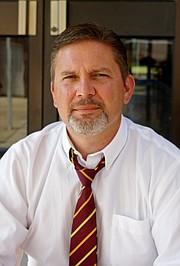A few weeks ago, students at my school participated in the Third Grade Reading Gate, also known as the day the state tells teachers they aren't trusted to do their jobs. I have long decried the Reading Gate as a waste of time and money because I don't believe it adds anything substantial to improving education. Instead, it causes anxiety for students and parents and takes the important decision of promotion or retention out of the teachers' hands. Since it is a computer-based test, there is a window of several days for schools to have students initially tested.
So if your school hasn't yet participated, don't worry. It soon will.
There have been several pundits and articles of late touting the virtue of the Reading Gate and other high-stakes tests, saying that they have improved education in Mississippi; however, the evidence used to support this claim is shaky at best, and many in the education field have called it into question.
Even though initial results show my students scored higher on the Reading Gate test this year than last, it still does not make me any less apprehensive towards it or the entire testing and accountability system in our state.
I do believe testing, if used properly and in context with other forms of teacher assessments, can be of benefit. Likewise, standardized testing can give insight, but as a diagnostic tool and not the final word on achievement; however, in Mississippi and other states, we use these tests to determine student promotion and graduation, teacher and principal evaluations, school-accountability rankings, and ultimately, school funding. Even test designers caution states against using these tests in this way, but we still do, because there are agendas to be met that are more important than children and learning.
Recently, a teacher came to me very upset over the Reading Gate test. She teaches a lower grade and has a student that, in her opinion, is "middle-of-the-road" academically. But computer assessments used to track student "achievement" show the student could very well fail the Reading Gate. Even though this teacher believes the student has met the reading skills needed to move on to third grade, she questions whether to recommend holding this student back due to fear of the student failing the Reading Gate. This teacher, a very dedicated professional and former Teacher of the Year, is now beginning to doubt her ability because the computer assessment doesn't match what she sees.
This is where we are in public education. Education policy has taken the professional judgment away from teachers and handed it over to corporations that make millions of dollars on making these tests, to state politicians who know nothing about education but look to use our schools to further their political careers, and to education bureaucrats—who have been so long removed from the classroom that they no longer understand what teachers face—that preach "data, data, data." High-stakes assessments and accountability systems have reduced students to little more than a score on a test and teachers to basically robots in a factory. This is wrong. There is so much more to learning than a Reading Gate score, or a proficiency level, or an ACT result. Students learn much more than is measured on a Subject Area Test, or a multiple-choice test, or a standardized writing assessment that is graded thousands of miles away by a scorer whose main qualification was being hired off a Craigslist advertisement. Schools are doing away with art and music, cutting back on recess and "non-academic" times, because of the pressure to score well on these tests. On the federal and state levels, the mantra has seemingly become, "If it isn't tested, it isn't important."
In all my years as an educator, I've had plenty of former students thank me for pushing them to do their best in my class. I've spoken to parents of former students who have regaled me with pride on what their children have become since graduating high school. We've spoken at length on the memories made while the student was in school, the ups and downs, what mattered then and what matters now.
I've yet to have any of them talk about their scores on a standardized test.
So over the next few weeks, as students take the Reading Gate, or the MAP, or the SATP, or the ACT, or any other standardized test, please take time to say a little prayer: for the students to do their best, for the teachers who worked hard all year to prepare them and for this madness to one day end.
Shannon Eubanks is the principal of the Enterprise Attendance Center in Brookhaven. Opinions stated here are his own.



Comments
Use the comment form below to begin a discussion about this content.
comments powered by Disqus